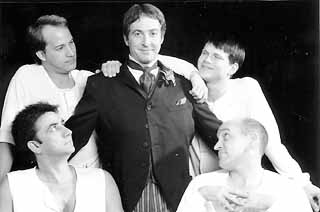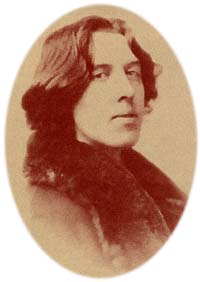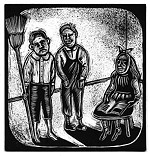Wilde Life
By Ada Calhoun, Fri., Jan. 15, 1999

"I'd like to welcome all the Walk-on-the-Wilde-Siders!" announced State Theater Company artistic director Don Toner during his curtain speech at the play Gross Indecency: The Three Trials of Oscar Wilde. The Importance of Being Oscar, An Artist of No Importance, Wilde and Woolly ... Tag lines for these events are always hokey, but Oscar Wilde lends himself to unbearable cuteness. Quoted everywhere, the Irish writer and cult figure is known the world over as the stereotypical dandy, dressed to the nines and ever-ready with a dazzling quip. In his most popular works, the novel The Picture of Dorian Gray and plays such as The Importance of Being Earnest, and in his own life (which he considered his ultimate work of art), Wilde played with language, with conventions, and with a dangerous, wonderful philosophy about capital-a Art as the ultimate reality to which life, at its best, aspires. The inevitable threat these ideas posed to Victorian England -- with which he had an ongoing love-hate relationship -- led to his very public humiliation as a criminal, guilty of "that worst of all crimes," sodomy. The rich, if overly pun-friendly, "Walk on the Wilde Side" Festival is winding to a close this week after a nine-day run of opera, theatre, and film about the king (queen?) of the wits.
The organizers insist that the festival all but fell into their laps. The Austin Lyric Opera folk, who already had Salome slotted for this season, heard that the State Theater folk had scheduled Gross Indecency for a run coinciding with that of Salome and contacted them about joining forces for some kind of combined PR blitz. The two companies then talked the Paramount Theatre into running a couple of Wilde films (the recent biopic Wilde starring Stephen Fry and the Forties film adaptation of The Picture of Dorian Gray) at the same time, and, voila! -- it's a festival. The event does have a sort of improvised feel to it, with each part offering a different, random piece of the huge puzzle Wilde remains. Paul Alvarado-Dykstra, marketing consultant for the Lyric Opera, stresses the fact that this festival, done on a shoestring, is an experiment prefiguring the glory days to come with the new Palmer Auditorium. Having the opera, ballet, and symphony all under one roof is sure to encourage more such interdisciplinary collaborations.
Not much thought seems to have been given to Wilde as harbinger of this new era, but he is the perfect choice, precursor as he was to so many social and artistic revolutions. Politically too, the timing is remarkable. The 1890s and the 1990s are in certain respects sister eras. The late Victorian Age celebrated conventionality, ethical witch hunts, and sexual priggery. A similar spirit of ugly, prying, self-righteousness currently reigns in Washington. Wilde fought to introduce what he felt to be the more interesting topics of beauty, pleasure, and self-development through art. Though touted as a wicked debauch in his day and since then as everything from a damned aesthete to a martyr for gay liberation, Wilde considered himself neither good nor evil, right nor wrong. He considered himself an artist and thus concerned with questions more important than those of morality and truth. He was amoral rather than immoral, believing that "self-denial is the shining sore" and it is more essential for things to be beautiful than true. "If one tells the truth," he said, "one is sure, sooner or later, to be found out." Brought down in the end by a sex scandal, the proud liar did not regret his pleasure-seeking lifestyle, despite the high price he paid.
The Lyric Opera's production of Salome, with text from Wilde's play serving as the libretto and music by Richard Strauss, opened the festival last Friday. Salome's story is fairy tale gothiceven in the Biblical account (Matthew 14). King Herod, having killed his brother and married his sister-in-law, entices his niece-cum-stepdaughter Salome to dance for him in exchange for which he'll give her anything she asks. Her mother Herodias persuades the girl to ask for the head of the prophet John the Baptist on a platter, as revenge for his condemnation of the Queen's sinful marriage. Wilde's 1894 play takes a few liberties with the Biblical account, introducing characters and making Salome an agent of her own scorned lust for John rather than an instrument of her mother. Because of its sexual overtones and religious theme, Wilde's Salome could not be publicly performed in Britain until many years after his death, though it was widely circulated in text form with Aubrey Beardsley's sex and death-glam drawings (the raunchier of which were suppressed until 1930). It has furthermore had a healthy afterlife in the form of not only a play and opera but also a film. Rita Hayworth's racy, body-stockinged Salome in the 1953 Columbia Pictures version was not much of a success, despite the fact that they significantly altered the story à la Hollywood, adding a happy ending in which Salome dances to save the prophet rather than have him killed.
Strauss' opera, like Wilde's play, had trouble finding willing venues. Salome was banned from the Met in New York and other halls for years because, in addition to the themes of incest, murder, and depravity (common fodder for operas), there were concerns that Salome, murderess of John the Baptist, was too likable.
Here in Austin (where the orchestra doesn't stand on ceremony -- hair-twirling and bare feet abound), the performance received a lengthy standing ovation and few gasps of horror. This is partially due to the jadedness of modern sensibilities and partly to the classiness of the production. The beefy soldiers and bickering Jews were all masterfully performed. Joseph Evans' Herod as lusty fool and Joyce Castle's Herodias as cackling stage mother were perfect. Robert McFarland was ideal as the scary, silver-bodied Jokanaan. Salome herself was tremendous, though the characterization was tamer than might, in the spirit of Wilde, be wished. Though Marquita Lister nailed the flightiness and unbridled, pouty charm of adolescence, she didn't entirely pull off the character's erotic side. The Dance of the Veils, for example, was far from the veritable lapdance of other interpretations. (For example: Though played as an ancient Palestinian striptease, Salome's flesh-tone snap-in-the-back bra was highly visible throughout.) When, however, in the last scene, Salome, drunk with lust, her own sexual power, and vengeance, kisses John's decapitated head, Lister comes into her own. Cooing "The mystery of love is greater than the mystery of death," her Salome reveals the character's desperate single-mindedness. It becomes clear that nothing is going to spoil their first kiss for Salome; never mind the fact that he has been decapitated by her order, his lips are full of blood, and she is unwittingly near death herself. In a beautiful, pathetic expression of infinite optimism she puzzles: "There was a bitter taste on thy lips ... They say that love hath a bitter taste."
In Wilde's own life, love was extremely bitter. De Profundis, the letter written in prison to "Bosie," Lord Alfred Douglas, Wilde's own personal siren and whirlpool, is one of the most virulent missives ever penned. Wilde ticks off grievance after grievance with a bookkeeper's precision and a toddler's fury. There's a great deal of philosophy, forgiveness, and revelation involved, but the letter boils down at times to one big "Fuck you for ruining my life!!!" The legitimacy for Wilde's anger is plainly evident in Gross Indecency, the play written and originally staged in New York by the celebrated Moisés Kaufman. Gross Indecency faithfully depicts the three trials that reduced Wilde in a manner of months from dashing wit to defeated prisoner. In a fatal mistake now legendary, Wilde (at Bosie's foolish insistence) took Bosie's father, the Marquess of Queensbury, to court for libel after the Marquess left a calling card at Wilde's club that read "Posing Somdomite" (sic). Of course, Wilde was not only a posing sodomite, but also a very enthusiastic one, so in the course of the case against the Marquess, the tables were turned and two trials accusing him of gross indecency ensued. At the heart of the Crown's case was the notorious line from a poem by Lord Alfred Douglas about "the love that dare not speak its name" -- that of an older man for a younger man. (Incidentally, this love was the theme of the 1994 British film A Man of No Importance, about a man directing a community version of Salome). In fact, Wilde's own art was used against him to great effect, and Gross Indecency succeeds in amusingly illustrating the absurdity of the case by today's standards.
 The acting is rock solid. David Stahl's Wilde is charmingly sympathetic. Guy Chandler Roberts' Lord Alfred Douglas is just the right mix of haughtiness, flippancy, good looks, and viciousness. The set is sparse but efficient, the pacing just right; it is a tight and information-packed production. Overall, however, the play comes off as the smart group's skit for literature class, more academic than moving. It's fascinating like the History Channel at its best, entertaining like a great lecture. At the same time, the quotes projected on the back wall, frequent oral footnotes, and bibliographic references leave one with a vague dread that a pop quiz waits at the exit. The audience, though enthusiastic, appeared more affected by various shocking historical factoids than by the emotion of Wilde's downfall. Intermission chatter ran to the tune of: "I can't believe the law against sodomy stayed on the books till 1967!" It was a night of fact, an irony considering Wilde accused facts of "vulgarizing mankind."
The acting is rock solid. David Stahl's Wilde is charmingly sympathetic. Guy Chandler Roberts' Lord Alfred Douglas is just the right mix of haughtiness, flippancy, good looks, and viciousness. The set is sparse but efficient, the pacing just right; it is a tight and information-packed production. Overall, however, the play comes off as the smart group's skit for literature class, more academic than moving. It's fascinating like the History Channel at its best, entertaining like a great lecture. At the same time, the quotes projected on the back wall, frequent oral footnotes, and bibliographic references leave one with a vague dread that a pop quiz waits at the exit. The audience, though enthusiastic, appeared more affected by various shocking historical factoids than by the emotion of Wilde's downfall. Intermission chatter ran to the tune of: "I can't believe the law against sodomy stayed on the books till 1967!" It was a night of fact, an irony considering Wilde accused facts of "vulgarizing mankind."
Lying was not a matter of morality for Wilde. Realism in art he saw as an atrocity. Why indeed would one ever paint things as they are when how they are is so trite and tedious? "It's called the real world because there's no need to talk about it in order to see it. And the other is the world of art; that's the one which has to be talked about because it would not exist otherwise," said Wilde. This calls to mind the Ursula K. Leguin line, something to the effect of "If words described reality perfectly, what would we need them for?" Art's lot is to document the way things should be. In Wilde's notorious essay "The Decay of Lying," he advocates the telling of "beautiful, untrue things." Life, he believed, should therefore imitate art, as the realm of art is in possession of a much more glorious potentiality than is the confined and finite "real world." Art as Wilde described it exceeds life in all regards, for "Life cheats us with shadows. We ask it for pleasure. It gives it to us, with bitterness and disappointment in its train." For this reason "Life is Art's best, Art's only pupil."
The Picture of Dorian Gray is key to Wilde's beliefs about the relationship between art and life. The painter Basil Hallward's portrait of Dorian is so beautiful that the sitter wishes "If it were I who was to be always young and the picture that was to grow old!" Wish granted, the portrait's subject rots away in the attic, bloody and decaying from age, cruelty, and vice while Dorian retains the bloom of youth. (Rumor has it Hurd Hatfield, who played Dorian Gray, made everyone nervous by aging little in real life.) The 1945 thriller based on Wilde's book and showing Thursday, January 14, at the Paramount offers a hint of "the love that dare not speak" as Basil and Lord Henry gush over the young, handsome Dorian. There is also a suggestion of Wilde's belief that art was capable of revealing a truth deeper than that offered by reality. High production values give the story a sleek glamour courtesy of ominous piano music and elegant sets. Supporting actress Angela Lansbury singing "Little Yellow Bird" is icing on the cake.
Andre Gide, in his small but important book of reminiscences about Oscar Wilde, remarks that Wilde's was "a life so strangely conscious, a life in which even the fortuitous seemed deliberate." Possibly even the tragic was deliberate, though it's hard to imagine anyone willing such agony. Wilde's downfall was by Wilde's own account terribly ugly. Bosie pushed him into the courts, made him appeal to the very forces he'd always held in contempt. He was forced to assume the first person, something he'd always disdained. "In art there is no first person," Gide remembers Wilde saying. It was the death knell for Wilde the disinterested artist. "Everything about my tragedy has been hideous, mean, repellent, lacking in style." It appeared so to Wilde at the time, but he later softened his reproach and from the late 20th century's vantage point, Wilde's debasement has a salvational quality.
From the festival offerings, it is possible to eke out an inspirational picture of the decadent figure so widely read, often quoted, and nervously celebrated by the gay liberation movement. He doesn't fit directly into the latter's platform, for Wilde never considered himself a "homosexual," though he did not hide (except in court) his fondness for loving, and having sex with, young men. (It was ugly, the thing of which they accused him, and surely he could not be guilty of anything ugly.) On the one hand, it may be said that Wilde the Artist, living for pleasure, was dragged down into the mire of Life by a bad boyfriend and a puritanical society. Wilde was comfortable in the realm of art, but life gave him trouble. From this point of view, the end was a sad example of the world dragging down a spirit too refined for its coarse understanding.
From another perspective, Wilde's suffering was simply a matter of adding dramatic depth to a shallow comedic character. "My life is like a work of art," Wilde often said. Wilde also proclaimed that "nothing in the whole world is meaningless, and suffering least of all." The bleak, lonely, painful episodes of Wilde's later life certainly added shadows to his triumph, but instead of an unfortunate accident, the tragedy may be seen as merely the inevitable second act to the flighty, epigrammatic early years. Wilde said that to deny one's own experience would be to deny the soul, that one should put one's genius into life and one's talent into works, that the supreme vice was shallowness. The depth that Wilde gained from prison was therefore a boon of the highest order, superior to wealth, social standing, and good health, all of which were sacrificed in the process. When in the end Wilde relocated to France under the pseudonym Sebastian Melmoth (appropriately taken from his grand-uncle's novel Melmoth the Wanderer), it was as a more complete, if less rakish, character. His life, his true artwork, became legendary and lasting when it acquired a sad ending. The alternative to prison would have been respectability abroad and old age, neither of which were compatible with Wilde's aesthetic. Most importantly, he was a martyr, not as has been so often claimed for homosexuality, but for Art and Beauty as lifestyle and refuge from the cruel, ugly Victorian world with its legal trials and stifling, joyless morality.
Gross Indecency: The Three Trials of Oscar Wilde runs through Jan 31, Thu-Sun, at the Main Theatre, ACC Rio Grande campus. Call 472-5143.
Salome runs through Jan 16, Fri & Sat, at Bass Concert Hall, UT campus. Call 800/31-OPERA.
The Picture of Dorian Gray screens Thu, Jan 14, at the Paramount Theatre, 713 Congress. Call 472-5470.








